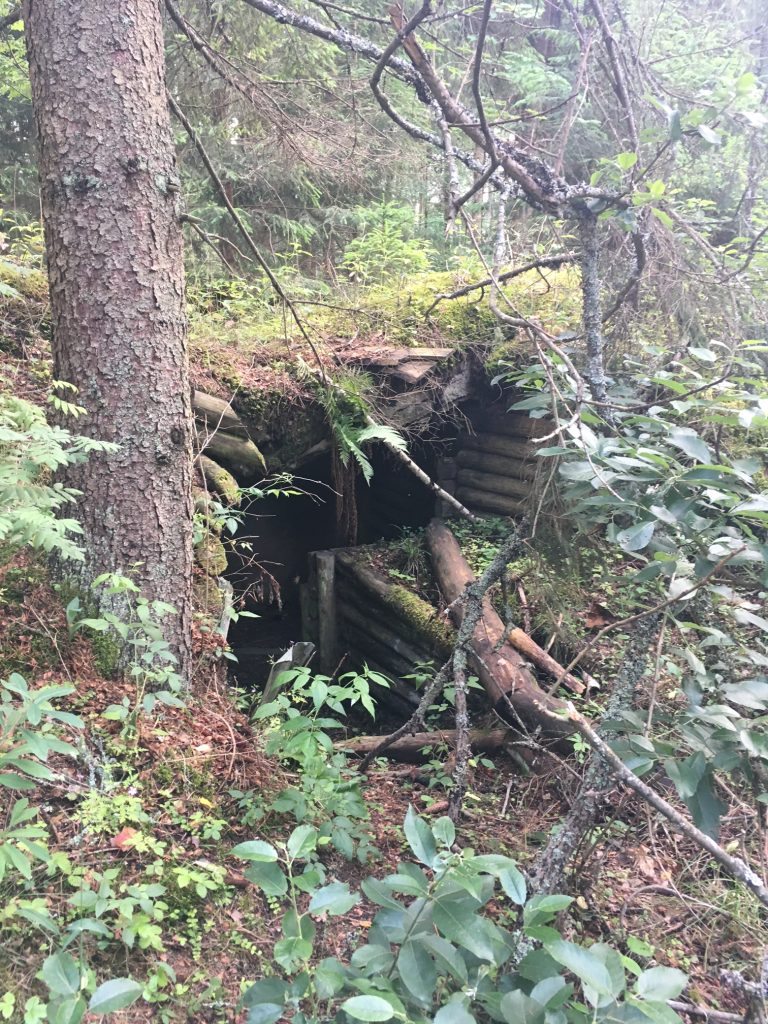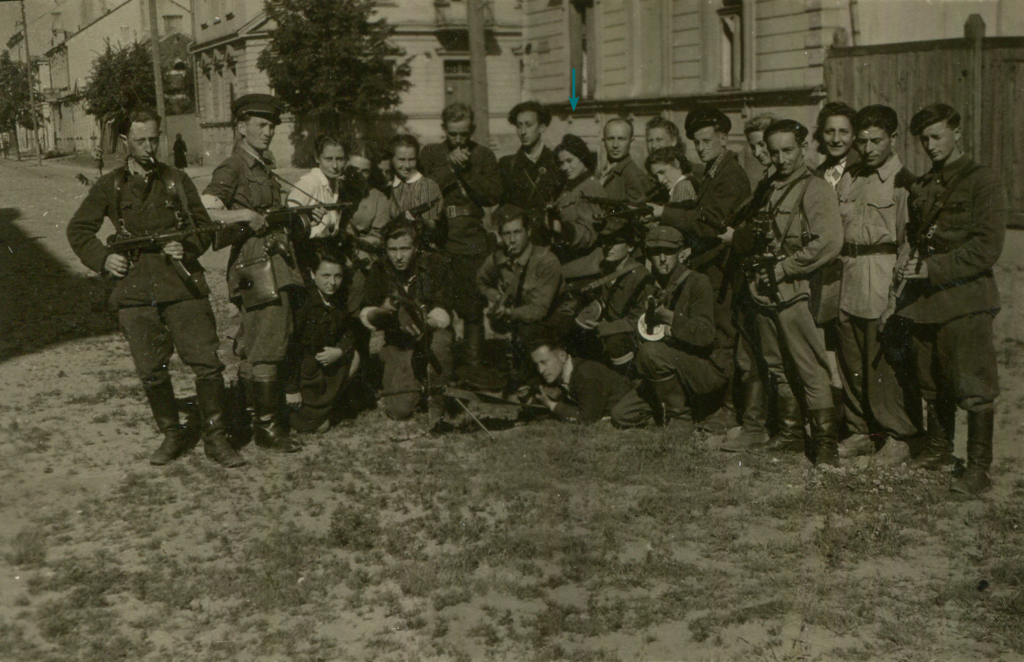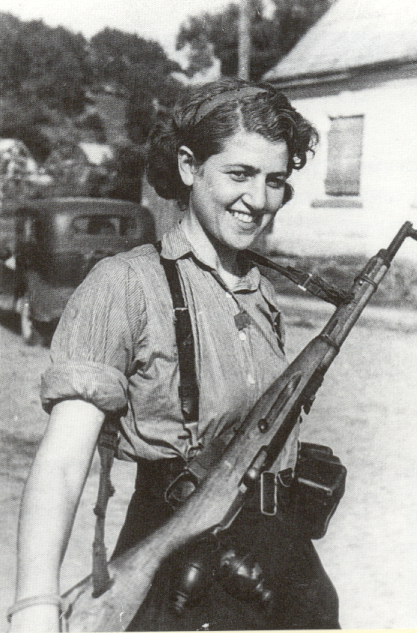Partisan squads fought in the Rūdninkai Forest, Kazėnai Forest, and Narutis Forest in Lithuania until July 1944. The partisans were suffering from constant hunger and severe living conditions; they were plagued by parasites, and it was difficult to maintain personal hygiene. There were strict rules and military order in the squads, but nonetheless, some social relations and traditions were formed. Women and men lived in the forests for almost two years.
The situation of the women in the different squads was not the same. Women were often treated with contempt and subjected to sexual harassment or abuse by squad members. Women and the girls who fought in the forest had to earn the respect and equal treatment of men by being courageous and demonstrating a strong will.
Young women living by the order of a squad were posed a moral dilemma: how to adapt to difficult living conditions and preserve the female identity?

“There were few women in the squad. Girls acted as liaisons. Especially those whose appearance was not typically Jewish – they were sent to a city to bring those who remained there to the partisans. It was very risky. Some women were doing intelligence tasks, communicating with locals. Some had different tasks, and others worked in the kitchen. While in the forest, we felt like we were men … But the commander of the squad once said, ‘You’re not men!’ Every time I had to prove my truth …”
Fania Yocheles-Brancovskaya
Bunker of the Jewish partisan squad ‘Avenger’ in the Rūdninkai Forest shown by Fania Yocheles-Brancovskaya.
Photo by Neringa Latvytė, July 2017
“For the first operation, I was selected the only one from all our women fighters; we felt that the fate of all the female part of the squad depended on me. If I accomplished the task entrusted to me, it would pave the way for other girls.”
Różka Korczak-Marla

Różka Korczak-Marla (1921–1988) – prisoner of the Vilnius Ghetto, a member of the underground organisation of the ghetto FPO (in Yiddish –
Fareinighte partizaner organizacie), and the fighter of Jewish partisan squad ‘Avenger’ in the Rūdninkai Forest. Różka Korczak is in the middle of the back row
Fighters of the Jewish partisan squad ‘Avenger’ after the war in Vilnius. From the left: Różka Korczak, commander of the squad Abba Kovner and Vitka Kempner.
Ружка Корчак. Пламя под пеплом. Тель-Авив: Библиотека-Алия, 1977

“The most pleasant surprise of that holiday [March 8] was the moment when our commander Kostas solemnly handed me a gun. Out of joy and surprise, I didn’t even thank him for the gift, but just started kissing and hugging the gun that was new and never used before. I was one of the first women in our squad who received her personal gun.”
Sara Ginaitė-Rubinson
Sara Ginaitė-Rubinson (1924–2018) – prisoner of the Kaunas Ghetto, a member of the underground organisation of ghetto
(in Yiddish – Antifashistishe kampf organizacie), and the fighter of the Jewish partisan squad ‘Avenger’ in the Rūdninkai Forest.
Sara Ginaitė in August 1944 in Vilnius. The photo was taken by a war photographer who was very surprised to see a female guard.
From the personal archive of Sara Ginaitė-Rubinson.
“On the 8th of March, all the women of the squad were free from any work and duties. All work, even the most ‘feminine’, was done by men. […] We washed ourselves, took care of our hair, and helped each other to dress nicely. Some of the girls wanted to look specifically ‘feminine’. They wore skirts, were dressed in colourful blouses, and painted their lips. Others wanted their clothing to prove girls’ equality with men. They wore trousers, jackets, and put on belts. I put on the new brown pants sewn for me by partisan T. Friedman right here at the base, a warm brown shirt, polished shoes, and two belts.”
Sara Ginaitė-Rubinson
“My mom ran a psychologically difficult marathon of life.”
The daughter of a Holocaust survivor
“Day-to-day life of our women was extremely difficult. For a long time, there was no bath to wash and an outdoor lavatory. We had to go deeper into the forest through the snow when we needed to wash body and hair. Like other partisans, I was tormented by lice and could not get rid of them. They relentlessly sucked our blood. Our struggle with the lice ended in their victory, and all our attempts to eradicate them failed. Another, no less difficult problem for our girls was the lack of hygiene items. Problems related to menstruation tormented us no less than parasites. We had to use ripped-off linen, buy rags from rural women, and wash them in remote places of the forest in cold water. Often they could not be dried, and we had to use damp rags. It was even harder to solve those problems at the time of hiking or guarding.”
Rachil Margolis
“My grandmother was talking […], was talking openly about it. She was open-hearted. She started talking later – when she was elderly. I doubt she could talk about it immediately after the war when her kids were still little. […] My mum and I weren’t discussing my grandmother’s past.”
Judita Gliauberzonaitė, the granddaughter of a Holocaust survivor